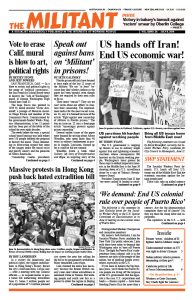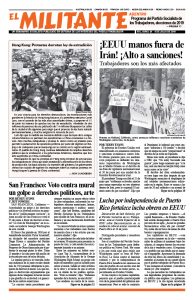In a victory for democratic and political rights, the biggest mobilizations in Hong Kong’s history forced the city’s chief executive, Carrie Lam — after a meeting with top Chinese officials — to suspend moves to pass a hated bill authorizing extradition June 15. Some 2 million people out of a population of 7.4 million jammed city streets the next day calling for the bill to be permanently withdrawn. Many demanded Lam resign.
Lam claimed the move was necessary because the former British colony’s laws don’t allow extraditions to mainland China or Taiwan. But working people and youth saw this as a pretext to allow the regime in Beijing legal cover to go after its political opponents in the semi-autonomous region. The people of Hong Kong continue to defend broad democratic and political rights they first wrested from the British rulers, rights which have been suppressed in mainland China.
Beijing has a history of secretly abducting people from Hong Kong for detention and “trial” on the mainland, as with five booksellers in 2015 who sold literature critical of top Beijing officials.
Even some major capitalists with close ties to the Chinese rulers opposed the law, worried they could be in danger if Chinese officials decided to go after them in one of their periodic crackdowns on “corruption.”
The British imperialists made Hong Kong a colony in 1841 after defeating China’s rulers in the First Opium War. Even after the victory of the Chinese Revolution in 1949, Hong Kong remained under British rule. It was not until 1997 that the capitalist island was returned to China under a “one country, two systems” arrangement. It has special administrative region status meant to last for at least 50 years. Under the deal, Beijing controls Hong Kong’s military and foreign affairs.
Hong Kong, a deep-water port and tied to the world capitalist banking and financial markets, was especially important to the Stalinist regime in Beijing as it opened up China to foreign capitalist investment and promoted Chinese capital.
Working people and youth in Hong Kong have stood up to numerous attempts to close down democratic rights. In 2014, students, trade unions and other supporters of political rights took to the streets in what became known as the “umbrella revolution,” demanding the right to directly elect government officials and in opposition to Beijing’s intervention in Hong Kong affairs.
The year before, dockworkers went on strike demanding better pay and working conditions at what was then the world’s third busiest container port.
And unlike mainland China — where the regime bans commemorations of the massive 1989 Tiananmen Square protests in Beijing that China’s military drowned in blood — in Hong Kong nearly 200,000 demonstrated on the June 4 anniversary.
Frances Hui, a student from Hong Kong at Emerson College in Boston, helped organize a June 9 Boston action in solidarity with the Hong Kong protests and spoke at a June 16 action in New York. She told the Militant June 21 that thousands attended solidarity events in “29 cities in 12 countries.”
The protests were large, Hui said, because of Beijing’s encroachment on “human rights and freedoms.” The bill would have meant “people who fled to Hong Kong after the [Tiananmen] massacre wouldn’t be safe.” The city, she said, “would become much closer to how the rest of China is operated.”
Unions join Hong Kong protests
The Hong Kong Confederation of Trade Unions encouraged its members to join the protests. “The extradition bill is very dangerous for Hong Kong people, especially workers,” Confederation Education Secretary Stanley Ho told Reuters June 12.
As opposition to the extradition bill mounted, Lam at first kept pushing to adopt it. But anger mounted after cops clashed with some protesters who had surrounded the Legislative Council Building, firing rubber bullets and tear gas and making arrests.
Chinese Foreign Minister Wang Yi blamed “Western forces” for trying “to sabotage Hong Kong’s stability.” The China Daily condemned “foreign entities” for misleading youth.
As the protests mushroomed, Lam — and top Beijing officials — were forced to backpedal. This was the first major climbdown in Chinese President Xi Jinping’s career. The Chinese rulers acted to derail any impact on workers on the mainland and in Taiwan and any effect on Beijing’s trade dispute and longer-term rivalry with Washington.
In 1997 Hong Kong represented a fifth of total Chinese economic output, but after rapid capitalist expansion in China, it is less than 3% today. Shanghai is now the busiest port in the world.
But the island city still channels about two-thirds of overseas investment to the mainland. It is still a hub for southern China including the major cities of Shenzhen and Guangzhou.
The rulers in Beijing worried that the protests in Hong Kong could spur actions by workers in China resisting speedup, low wages and government repression. All the news in the capitalist press about developments in China and Beijing’s competition with Washington for economic supremacy avoid this, the real factor that will affect the future — the rise of the class struggle.


